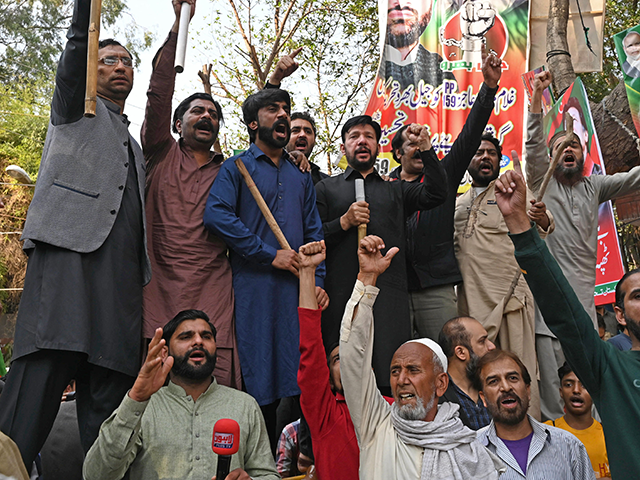A squad of police officers from the Pakistani capital of Islamabad arrived at the home of former Prime Minister Imran Khan in Lahore on Sunday with an arrest warrant, but failed to apprehend him as a mob of Khan supporters formed a protective ring around his house.
Islamabad police officials understatedly described Khan as “reluctant to surrender,” and said that when the superintendent of police finally gained entry to the home, “Imran Khan was not present there.”
The long-brewing confrontation between the former prime minister and police was triggered by Khan blowing off a courtroom appearance last Tuesday. Khan is the subject of four active prosecutions, one of which concerns allegations that he illegally received gifts from foreigners during his term in office.
Khan considers all of the allegations against him to be “fake” charges manufactured by his political opponents and hostile foreign powers like the United States, but he is especially contemptuous of the gift investigation, known as the “Toshakhana case” after the government agency that oversees foreign gifts to Pakistani officials. The judge in the case vowed to issue a warrant for Khan’s arrest if he skipped one more court hearing, and that line was crossed last week.
“I am being summoned in fake cases and the nation should know about them. It will be a bad omen for the country if the nation does not stand against the corrupt rulers,” Khan told his phalanx of protective Pakistan Tehreek-e-Insaf (PTI) party supporters on Sunday, mysteriously reappearing hours after the police superintendent was told he was not at home.
Khan said he refused to comply with the arrest warrant because the police “know there is a threat against my life” and did not make adequate provisions for his security. Khan was shot in the leg during an assassination attempt in November.
Islamabad Inspector-General Akbar Nasir Khan insisted the police had to arrest Khan to preserve the rule of law, and pleaded with his supporters not to obstruct further attempts. PTI leaders threatened “countrywide protests” that would be “extremely destabilizing” to Pakistan’s shaky and bankrupt government if the police try to take Khan in to custody again.
The judge in the Toshakhana case, Zafar Iqbal, on Monday denied PTI’s request to cancel his no-bail arrest warrant and insisted Khan should be taken into custody.
“The accused was in a position to appear in this court on Feb 28 after his appearances in different honorable courts but he willfully avoided to appear in this court,” Iqbal ruled, alluding to Khan making appearances in three other courtrooms last Tuesday while pointedly avoiding his.
Pakistani media reported on Monday that Khan’s application for protective bail in the Toshakhana affair, and two other pending cases against him, might be rejected by the Lahore High Court because he did not file all of the required documents.
Under Pakistani law, protective bail essentially shields Khan against arrest for as long as the court sees fit to extend it. Khan’s protective bail agreements on some of the charges against him have already been extended several times.
The government of Prime Minister Shehbaz Sharif, who took power after Khan was booted from office with a parliamentary no-confidence vote in April 2022, responded to Khan evading arrest by banning him from Pakistani airwaves.
The Pakistan Electronic Media Regulatory Authority (PEMRA) issued an order on Sunday that accused Khan of “baseless accusations and spreading hate speech.” The agency barred all satellite TV channels from broadcasting any of his live or recorded speeches because they were deemed “prejudicial to the maintenance of law and order” and “likely to disturb public peace and tranquility.”
Senior PTI leader Fawad Chaudhry immediately denounced the PEMRA order as a “nefarious attempt to suppress Imran Khan’s voice,” and urged Pakistani media organizations to join PTI’s court challenge against the broadcast ban.

COMMENTS
Please let us know if you're having issues with commenting.